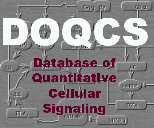| Name | HomoArginine |
| Accession Type | Pathway |
| Transcriber | Sharat J. Vayttaden and Prasoon Agarwal, NCBS |
| Developer | Abu-Soud HM, Wang J, Rousseau DL, and Stuehr DJ |
| Entry Date (YYYY-MM-DD) | 2006-08-07 00:00:00 |
| Species | human |
| Tissue | Kidney cell expressing the rat brain nNOS |
| Cell Compartment | Cytosol |
| Source | Abu-Soud HM et al. Biochemistry. 1999 Sep 21;38(38):12446-51. ( Peer-reviewed publication ) |
| Methodology | Quantitative match to experiments |
| Model Implementation | Exact GENESIS implementation |
| Model Validation | Approximates original data |
| Notes | This model is taken from the Abu-Soud HM et al. Biochemistry. 1999 Sep 21;38(38):12446-51 This model shows kinetic binding of HomoArginine to neuronal nitric oxide synthase.
Model shows the substrate (Homorginine) binding to nNOS in a two-step reversible fashion. First there is rapid binding equilibrium between Im-nNOS and Homoarginine to form an intermediate that contains bound imidazole and homoarginine. This is followed by a slower conformational change in the Im-enzyme-substrate complex that is associated with release of bound imidazole and generation of a modified enzyme-substrate complex which is detected due to spectral change. Rates approximated based on data in Table 2. The rates for first reaction are not exact since only Kd known and appropriate graphs do not exist for matching the kinetic profile.
|

